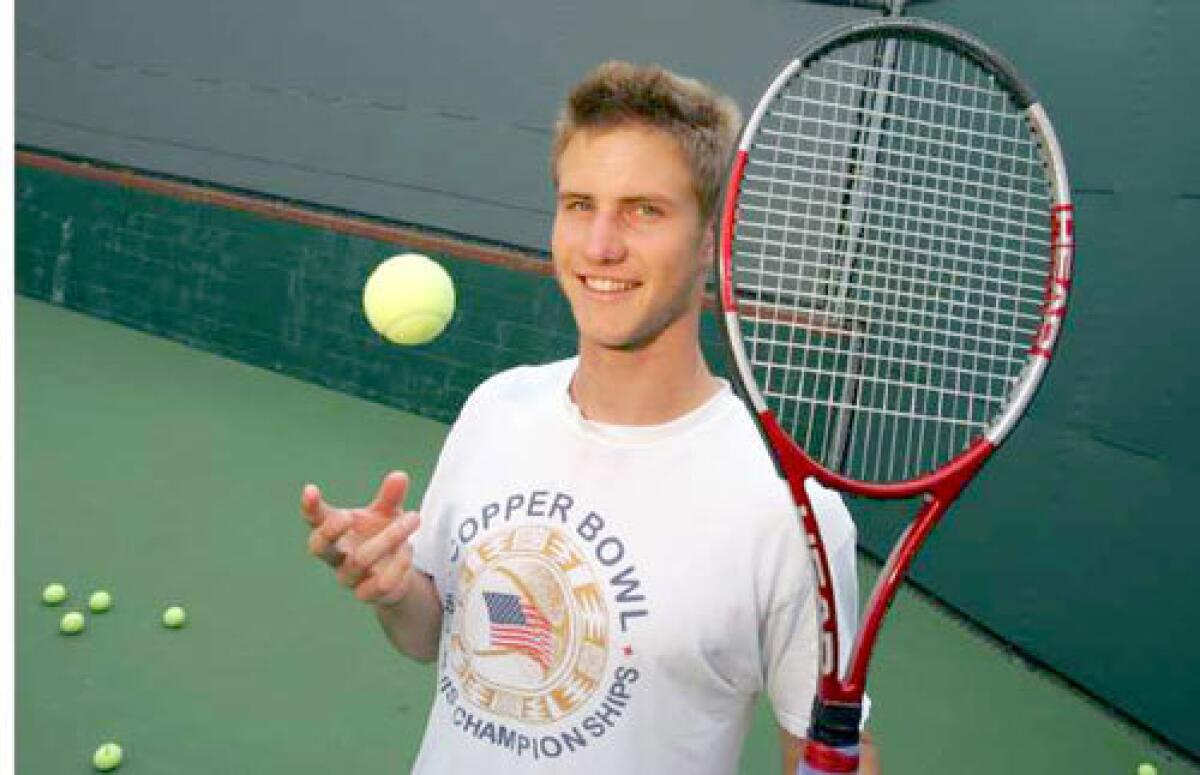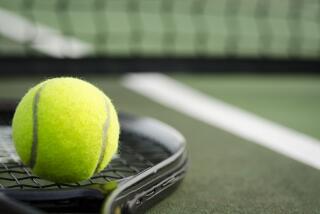Thacher has a straight-A game

- Share via
As debate rages about the decline of men’s tennis in the United States, along comes 17-year-old Ryan Thacher of North Hollywood Harvard-Westlake, and maybe there’s hope after all.
Ranked No. 1 in the nation by the U.S. Tennis Assn. in the 18-under age group, Thacher stands 6 feet 3, can throw a football 50 yards, is a straight-A student and won 46 consecutive matches and seven tournaments this year.
And yet, he has no intention of turning pro any time soon, which makes him, thankfully, not normal.
He pays for his own rackets, doesn’t accept sponsorships, doesn’t have an agent and showed his integrity last month by pulling out of the prestigious Ojai Valley tournament, where he was top seeded in the boys’ CIF Interscholastic division, when he concluded he had missed too many days of school and needed to focus on academics.
He’s a breath of fresh air for a sport in desperate need of new talent.
“Ryan Thacher is so far above everybody else that it is ridiculous,” Irvine University Coach John Kessler says. “He is an incredible athlete. It is almost like a man playing with boys.”
The burning question in U.S. tennis has been, “Where have all the great players gone?”
The trend has been for top American teenagers to spurn the college game, turn pro and try to mature and grow up while competing against the world’s best. All that has produced is Andy Roddick, one of the few recognizable U.S. players in the men’s ranks.
Thacher, like some others, has come to the conclusion something is wrong.
“My thought on United States tennis is that over the last 10 years, it’s changed its mentality, possibly in the wrong way,” he said. “There have been trends in world tennis, in Europe, Spain and Argentina, where kids have dedicated themselves so much that they’re becoming professional tennis players at 16, 17, and it’s like the U.S. doesn’t want to drop behind the ball.
“So this trend of not going to school, playing five hours a day whatever it is, it doesn’t seem to be working for the U.S.”
Thacher, a junior, is convinced the way to prepare teenagers in the U.S. for the professional ranks is through the college game, in the tradition of John McEnroe and Jimmy Connors, who attended Stanford and UCLA before becoming successful pros.
“One reason I’m excited about going to college is I think it’s one of the greatest things America has to offer,” Thacher said. “Not only academically, but tennis too. Nowhere else are you getting the constant attention on the court, the guaranteed matches. I feel that needs to be emphasized as the course of action for tennis players.”
Tennis was one of several sports Thacher played as a youngster. He was a club soccer player, competed in Little League baseball and was a flag football quarterback in middle school. He can probably dunk a basketball if asked.
At 14, his parents let him play in his first national tennis tournament, and by his sophomore year of high school, tennis became his exclusive sport.
The fact that he’s still relatively new to the game allows him to avoid burnout issues that others encounter.
“Since I still don’t travel that often, each tournament is magnified even more,” he said. “When I get on the court, maybe I have more focus just because they have been doing it for so long. It’s still sort of new for me even after doing it for four years. I still get that excitement that sometimes I think they have lost from doing it so long.”
Thacher has a strong work ethic, but he’s not a fanatic. He doesn’t play tennis day and night. He can see himself playing professionally, but he wants an insurance policy — a college education — before he embarks on what he considers “a risky endeavor.”
Even his rise to No. 1 in the USTA rankings has not changed his outlook.
“I could have never envisioned myself in the position I am now with that ranking, but at the same time, it is junior tennis and in the long run, it doesn’t mean all that much,” he said.
“I recognize it is a great accomplishment, but it’s not giving me ideas that now that I’m No. 1, my professional career is inevitable. That’s not the case. There’s so many kids out there and there’s an upper echelon of junior tennis that I haven’t even begun to delve into.”
But it’s Thacher’s improvement since he began to focus solely on tennis that has many convinced of his future greatness. Thacher senses the breakthrough he has made this season.
“When I wasn’t playing as much, I relied a lot on my athleticism,” he said. “I’d run down a lot of balls, but maybe now, I do more with it once I get there. In a way, it’s one of the benefits of the cross-training I’ve gotten from playing other sports.”
The Southern Section team tennis playoffs begin this week, and Thacher will make himself available to play for the Wolverines. But he won’t be competing in the section’s individual competition, not wanting to start something he won’t be able to finish because of national tournament commitments.
He’s also not close to making a college choice, though strong academics will be a must since he had a 4.3 grade-point average at the end of his sophomore year.
Thacher is the rarest of teenagers, an intellectual heavyweight with terrific athletic skills who has the common sense to be in no rush to join the tennis elite until he’s ready.
Eric Sondheimer can be reached at eric.sondheimer@latimes.com.
More to Read
Go beyond the scoreboard
Get the latest on L.A.'s teams in the daily Sports Report newsletter.
You may occasionally receive promotional content from the Los Angeles Times.










